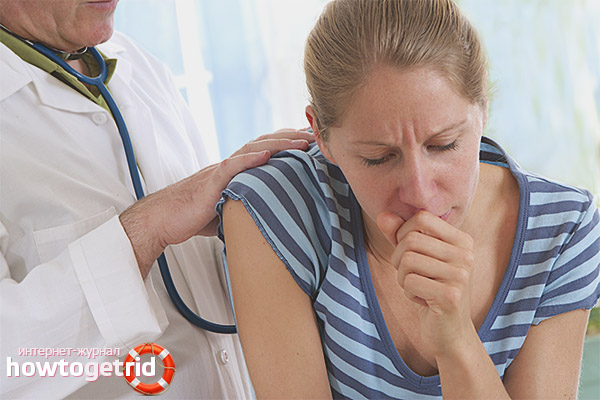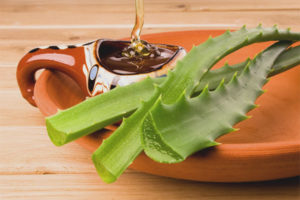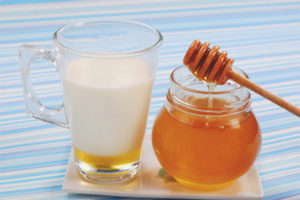The content of the article
Bronchitis is an inflammatory process in the organs of the respiratory system. The disease is acute and chronic. A prolonged cough lasts about 3-4 weeks. Bronchitis often accompanies acute respiratory illness if inflammation affects the bronchial tree. Also, chronic smokers suffer from chronic bronchitis.
Doctors do not consider inflammation in the bronchi to be life-threatening, but without the necessary treatment, the disease leads to the development of complications. One of them is pneumonia, which is protracted and requires close attention and specific treatment. Therapy of bronchitis and its complications are different. It all depends on the symptoms and nature of the complication. In some cases, it is considered as a separate disease.
Types of bronchitis
Classify the disease according to etiology. In medicine, bronchitis is revealed:
- Viral - when the disease is caused by pathogenic microorganisms against the background of influenza, infection, as well as a common adenovirus infection.
- Tuberculous - cough is caused by tuberculous bacteria.
- Infectious - the disease provokes the multiplication of atypical bacteria.
- Allergic - an ailment appears under the influence of allergens, which are an internal irritant for the bronchi.
- Toxic-chemical - the appearance of cough on the background of poisoning the body with toxic substances, develops in an unfavorable environment at work or with a poor etiology of the place of residence.
In adults, the disease is diagnosed at any age. The doctor also determines bronchitis according to the symptoms and nature of development. The inflammatory process can develop independently or be secondary in another disease. Differentiate the disease by their nature and symptoms:
- The acute form - develops against the background of an acute infection or flu, responds well to the prescribed therapy, as a result of which a fairly quick recovery occurs.
- Chronic form - has a long duration and does not respond well to the prescribed therapy, the ailment is accompanied by a chronic cough.
Signs of bronchitis
The further treatment regimen depends on the symptoms of the disease. Therapy is prescribed by a qualified doctor. Different types of bronchitis differ in their symptoms. The main symptoms of various forms of the disease:
Infectious bronchitis (mild course)
Recognizing the infectious nature of bronchitis is quite simple. An experienced doctor will immediately establish the diagnosis correctly. The main symptoms in the mild course of the infectious form of the disease are:
- dry cough, sometimes becoming wet;
- discomfort and a feeling of constriction in the chest;
- low-grade body temperature;
- feeling of general weakness;
- a clear decrease in performance;
- very hard breathing and wheezing directly with a deep breath;
- poor blood count.
Infectious form of bronchitis (severe course)
The ailment is usually accompanied by a strong cough and shortness of breath on exhalation. The patient is constantly suffering from chest discomfort. Against the background of a strong overstrain of the abdominal muscles due to coughing, periodic abdominal pain may occur. The main symptoms of this form:
- labored breathing;
- very strong cough and chest pain;
- purulent or serous-purulent sputum;
- wet wheezing when listening;
- severe malaise.
Acute bronchitis
At the very beginning of this form of the disease, a dry severe cough is diagnosed. It intensifies at night and comes with excruciating attacks.Further, the cough becomes wet - secretion increases, and the bronchi try to get rid of the accumulated mucus. The main manifestations of acute bronchitis:
- coughing;
- high t;
- fatigue and weakness;
- fever;
- chest pain;
- loss of performance;
- dry wheezing in the lungs.
Chronic form
Usually, in a chronic form, viscous sputum is constantly separated. The process is accompanied by a strong paroxysmal cough. It is lingering. With remission, sputum resembles the usual mucus, but can acquire a brown or yellow color. Miners often suffer from chronic bronchitis. In chronic bronchitis, the main symptoms:
- persistent cough;
- dyspnea;
- serous-purulent sputum with exacerbation.
Allergic bronchitis
The disease has an allergic cause. Coughs provoke strong allergens that irritate the bronchial mucosa. Symptoms are:
- difficulty breathing
- dyspnea;
- there is constant coughing;
- scattered wheezing is heard.
Toxic bronchitis
Poisoning with toxic substances causes a severe painful cough. After a certain period of time, already wet sputum begins to depart. Body t rises. The toxic form of the disease is accompanied by:
- coughing
- pains that occur directly in the chest;
- general malaise;
- very severe weakness;
- loss of performance;
- dry wheezing in the lungs.
The mechanism of development of bronchitis
Infection of the lower respiratory tract occurs. The disease affects the trachea, bronchi and lungs. In adults, bronchitis occurs with some differences. In an adult, the muscles of the chest and all blood vessels are well developed. Also, the skill of coughing is already well formed. Children, unlike adults, do not know how to fully clear the bronchi from accumulated sputum. Also, adults have a wider lumen of the bronchial tree, which contributes to better cleansing and faster discharge of mucus.
Bronchitis develops primarily or is an associated secondary ailment. The disease provokes the activity of harmful viruses. They penetrate by airborne droplets and through the nose and mouth enter the bronchi. Bronchitis appears due to the action:
- rhinovirus;
- flu
- enterovirus;
- bacteria attacks.
Often the disease is mixed bacterial in nature. Pathogenic organisms irritate the mucous membrane of the organ and destroy the structure of the mucous membrane. The main symptom of bronchitis is a cough.
Complications of bronchitis
What is the danger of this ailment? A very serious danger is for a patient with adult bronchitis pneumonia. With her, the infection goes down into the airways of the lungs. Infection of organic tissues and alveoli occurs. Diagnosed with pneumonia, which, without proper treatment, can cause death. With pneumonia, the walls of the bronchi lose their elasticity, sclerotic changes in the tissues begin, ventilation of the lungs and air exchange in the lung tissue deteriorate.
A frequent manifestation of bronchitis can trigger asthma. The disease is a chronic disease of a non-infectious nature, in which inflammation of the respiratory tract is observed. Asthma is accompanied by attacks of shortness of breath, choking, and coughing. It develops after bronchitis. Currently, bronchial asthma is considered a social problem, since a very large percentage of the world's population suffers from the disease.
With bronchitis, obstruction of the deep layers of the bronchi can also occur.This is fraught with deformation and scarring of organic tissue. Complication is accompanied by severe painful cough, impaired respiratory function, narrowing of the lumen of the bronchial tree. Very often, obstructive bronchitis causes the development of bronchial asthma.
Treatment
Only complex therapy will help to cope with the disease at any stage. It should be aimed at eliminating the symptoms of bronchitis, facilitating the discharge of sputum and restoring respiratory function. Tactics for combating the disease also include bed rest and taking medications prescribed by your doctor.
Antibiotics for the disease
Adults who suffer from bronchitis are prescribed such antibacterial agents:
- macrolides;
- the so-called aminopenicillins;
- cephalosporins;
- fluoroquinol preparations.
A new generation of broad-spectrum antibiotics is active against many pathogenic microorganisms. Bronchitis can cause streptococci, pneumococci, staphylococcus. Medications antibiotics destroy the cell membranes of bacteria and stop their activity.
Antibiotics destroy pathogens, eliminate the inflammatory process in the bronchi. You should know that treatment with drugs from the penicillin group can cause an allergic reaction.
To eliminate bronchitis, the following aminopenicillins are used:
- Amoxiclav;
- The drug is Augmentin;
- Flemoxin Solutab.
Of the macrolide agents are used:
- Azithromycin;
- Erythromycin;
- Medicamycin;
- Sumamed.
The group of fluoroquinolones - drugs that are used for intolerance to antibiotics I and II series. Fluoroquinols stop the activity of bacteria, destroying the DNA of pathogenic microorganisms. In the treatment of bronchitis are used:
- Pefloxacin;
- Ofloxacin;
- Cyprolet;
- Levofloxacin.
The group of cephalosporins is a kind of reserve. It is used for complicated obstructive bronchitis. In some cases, the following may be prescribed:
- Cephalexin;
- Ceftriaxone;
- Cefazolin;
- Cefixime
Often with bronchitis, antibiotic injections are prescribed. Applied therapy with penicillins, Gentamicin, Ceftriaxone. An antibiotic from an ampoule enters the blood faster and has a more powerful effect. Typically, injections are used for exacerbation of bronchitis.
Taking antibiotics can provoke the development of dysbiosis. It is imperative to support the work of the gastrointestinal tract by the use of lactic acid bacteria. Together with antibiotics, Linex, Bifidumbacterin are prescribed. It is known that some foods (smoked meats, fried foods, pastry sweets) produce a strong load on liver cells. In the treatment of bronchitis, this organ experiences a great load. Therefore, when taking medicines, you must adhere to the correct diet - eat only digestible food, exclude fried and fatty.
Expectorant medication
Therapy should be aimed at improving the withdrawal of mucus from the bronchi. The disease provokes a cough. To get rid of it, you need to quickly clear the bronchi of mucus and reduce its secretion. In the treatment of ailment, expectorant and antitussive agents are widely used.
The preparations are made on the basis of medicinal herbs of marshmallow, thermopsis and fruit collection. Sputum thinning medication:
- Mukaltin;
- Alteyka;
- Thermopsol;
- Codelac Broncho;
- Bronchophyte.
Vitamins
The use of vitamin complexes for bronchitis helps to maintain and strengthen immunity. What vitamins should be taken with an ailment? Vitamins of group B will help relieve cramps, reduce the inflammatory process. These vitamins have an active effect on pathogenic microorganisms.
Vitamins protect the respiratory tract and enhance the immune system. As you know, it is the immune system that is responsible for quick recovery. With good immunity, the necessary amount of antibodies is produced, and cellular oxygen consumption increases.The disease gradually recedes.
Vitamin complexes for adults help to cope with the disease:
- Multimax;
- Alphabet Classic;
- Revit
- Multi-tabs;
- Biovitrum;
- Sanovit.
All of the above drugs have a beneficial complex effect on the body. Vitamins improve blood supply to the lungs and bronchi, improve blood microcirculation, and trigger the necessary processes of cell regeneration inside the human body.
Mustard plasters for bronchitis
Treatment with mustard with a strong lingering cough shows a quick positive therapeutic result. The action of mustard is based on mechanical irritation of the surface vessels and organic tissues of the bronchi. After installing mustard, the skin becomes hot, redness is observed. It is affected by mustard essential oils. They start the processes necessary for recovery. After mustard, the bronchi come into activity and begin to intensively get rid of mucus.
Mustard plaster:
- improves sputum excretion;
- relieves the inflammatory process;
- activates blood supply to the bronchi;
- warms up the underlying tissue.
- cramps
- spinal diseases;
- cancer;
- pulmonary tuberculosis;
- poor blood coagulability;
- skin rashes;
- psoriasis;
- hypertension;
- heart failure.
Breast Fees
Herbal medicine is a powerful assistant in the fight against cough. Medicinal herbs have a safe therapeutic effect. Contribute to liquefaction and expectoration of sputum from the bronchial tree, reduce coughing attacks, and relieve the inflammatory process. It is useful to take such plant infusions and decoctions:
- coltsfoot, calendula, plantain;
- marshmallow root, licorice root, coltsfoot;
- chamomile, rose hip, marshmallow, linden;
- mint, sage, yarrow, eucalyptus.
Antitussive herbs have a powerful healing effect. You can make a breast collection yourself, taking various types of herbs. Raw materials are taken in equal parts, brewed in a thermos or pan, insisted, filtered. Take 1/3 cup 3-4 times a day. It is better to drink herbs on an empty stomach when the stomach is not full of food and does not digest it. It is also necessary to eat the fruits of mountain ash, viburnum, currants, raspberry jam.
It is useful to add lemon and a spoonful of honey to herbal tea. Such a healing drink will quickly remove the heat, soothe the throat irritated by cough, relieve its redness, and reduce the amount of sputum excreted. A healthy drink must be taken before the symptoms disappear. Comprehensive measures in the fight against the disease will surely give a quick positive result and lead to a speedy recovery.
Video: treatment of acute bronchitis with folk remedies












Submit